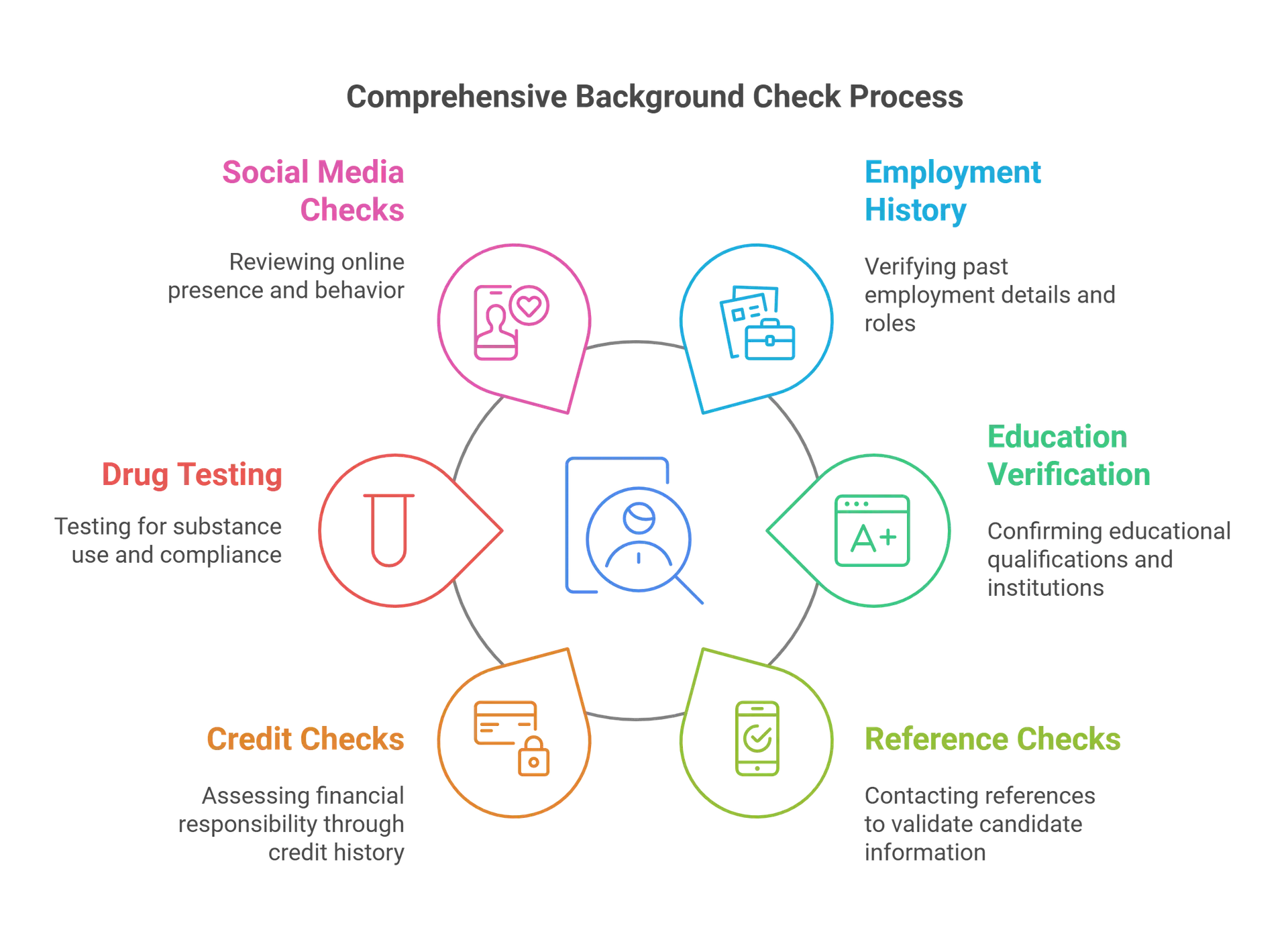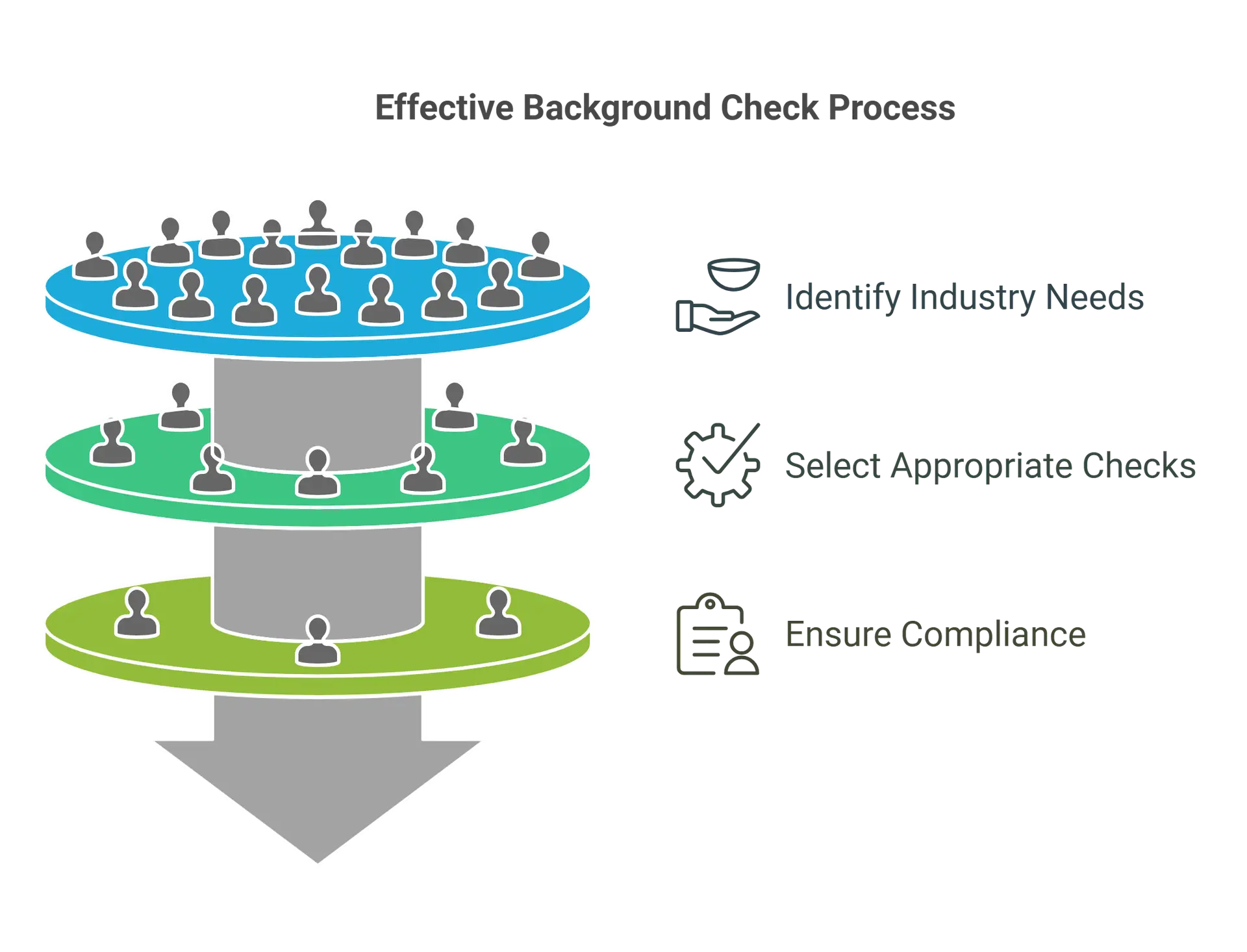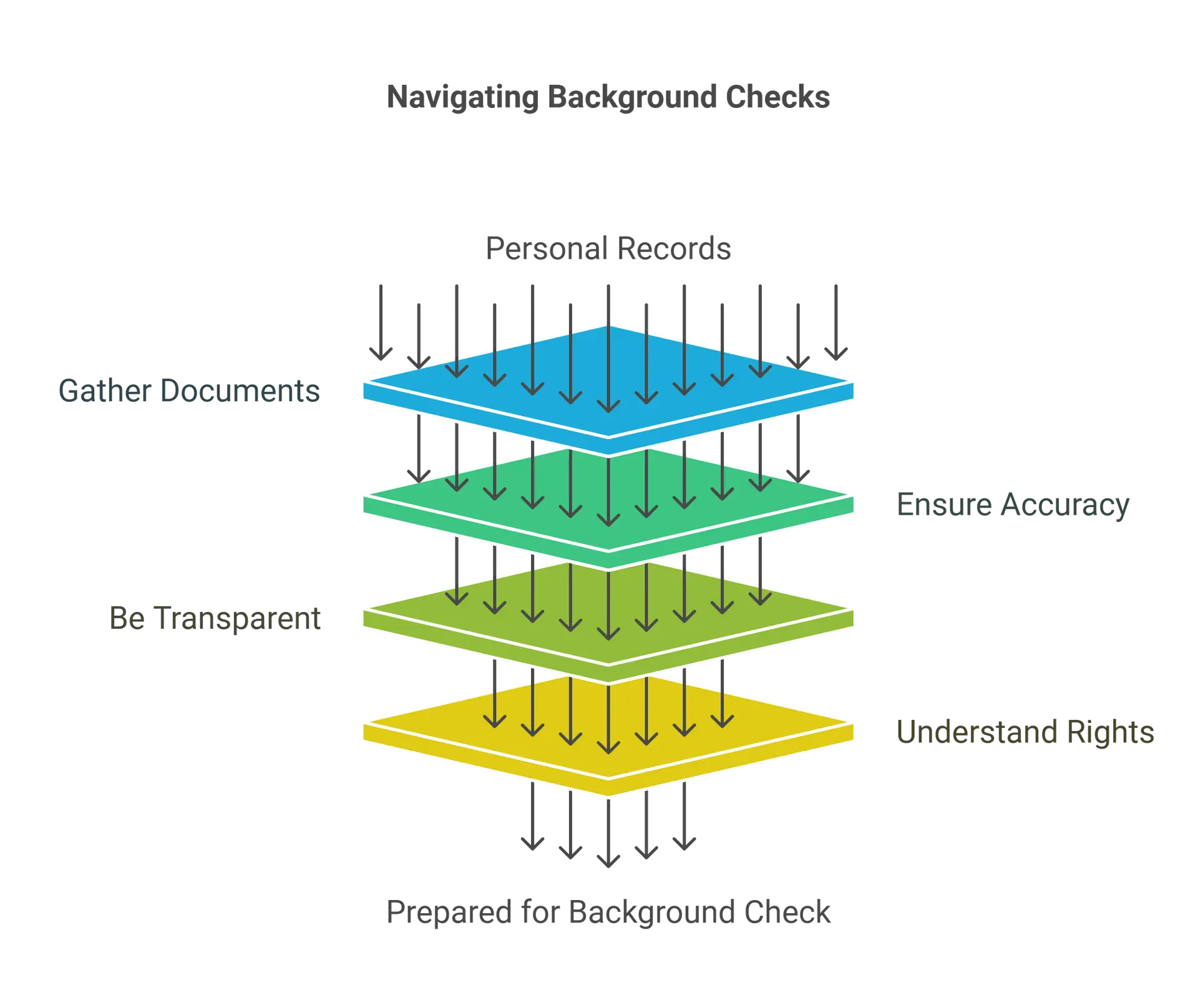Background checks have become a critical step in the hiring process in today's competitive job market. They help employers make informed decisions and ensure a safer and more secure workplace. However, with so many different types of background checks available, it can be challenging to know which one to choose or what each entails.
This guide aims to demystify various background checks for business owners, HR professionals, recruiters, and job seekers. We'll cover the basics, dive into industry-specific checks, and offer practical insights to help you navigate this essential aspect of hiring.
Key Takeaways
- Importance of Background Checks: Employment background checks ensure workplace safety, security, and integrity by verifying a candidate's history and qualifications.
- Types of Checks Conducted: Background checks include criminal records, employment history, education verification, credit checks, and drug testing, each serving different purposes based on the job role.
- Legal Compliance: Employers must navigate federal and state laws, including the Fair Credit Reporting Act (FCRA), to ensure that background checks are conducted legally and ethically and avoid potential legal repercussions.
- Impact on Hiring Decisions: The results of a background check can significantly influence hiring decisions, with red flags such as criminal convictions or discrepancies in employment history often leading to a reconsideration of a candidate’s suitability.
- Transparency and Candidate Rights: Candidates have the right to be informed about background checks, to consent before they are conducted, and to dispute any inaccuracies found in the reports, ensuring a fair hiring process.
Introduction
In today's fast-paced job market, background checks have become non-negotiable. Whether you're a business owner, HR professional, recruiter, or job seeker, understanding background checks is critical. This isn't just about making informed hiring decisions; it’s about ensuring a safe and secure workplace for everyone involved.
Background checks offer a window into a candidate’s past, often unearthing crucial information that could influence hiring decisions. They play a key role in risk mitigation by helping avoid negligent hiring practices and building a trustworthy employer-employee relationship. This guide aims to untangle the complexities surrounding various background checks and provide practical insights tailored to different hiring roles.
Background checks play an essential role in maintaining workplace safety. As experts in the field of human resources, it’s our responsibility to ensure that we conduct these checks with diligence, respect, and an understanding of the unique needs of each role and industry. While there is complexity in the process, it provides both employers and candidates a service founded in trust and transparency. At the heart of it all, these checks are not just about ticking the checkbox to verify historical data —they’re about creating a culture of integrity and responsibility.
12 Types of Background Checks

1. Criminal Background Checks
A criminal background check is a staple in the hiring process for many industries. At its core, it involves reviewing an individual's criminal history to assess their suitability for a specific role. For some sectors like healthcare, transportation, and retail, these checks are not just a preference—they're often a legal and moral necessity.
Overview
A criminal background check typically encompasses a search of national, state, and local criminal databases to uncover any past convictions, arrests, or legal issues. Information revealed may include misdemeanors, felonies, pending charges, and sometimes even infractions.
Industry Focus
In healthcare, criminal checks are crucial for ensuring patient safety and maintaining trust. It's not just about weeding out those with a violent past but also about identifying potential drug abuse histories. In transportation, the stakes are equally high. Companies need assurance that their drivers or operators don’t have a history that could compromise public safety. Retail, while seemingly less critical, also benefits significantly. For retailers, background checks help minimize theft, fraud, and ensure a safe environment for both customers and employees.
Common Misconceptions
There are several myths surrounding criminal background checks. One widespread belief is that any criminal record will automatically disqualify a candidate. In reality, many companies consider the nature of the offense, its relevance to the job, and how long ago it occurred. Another misconception is that minor infractions will not show up. While laws vary by state, even relatively minor offenses can sometimes appear in comprehensive checks. Lastly, applicants often worry that sealed or expunged records will come back to haunt them. Generally, such records are not disclosed in standard criminal background checks, but this can depend on the extent and thoroughness of the check conducted.
Understanding the scope and limitations of criminal background checks demystifies the process and helps both employers and employees approach it with informed confidence.
2. Employment History Verification
Employment history verification is a standard procedure in the hiring process, designed to confirm the accuracy of a candidate's job history. This entails reaching out to previous employers to verify job titles, dates of employment, job duties, and reasons for leaving.
Benefits
Verifying employment history has several advantages. For one, it ensures that candidates are truthful about their experience, thus mitigating the risk of hiring underqualified individuals. Staffing agencies benefit immensely from this, as it allows them to maintain a high standard of candidate placement. In the technology sector, where specific skill sets and experiences are critical, this verification helps in ensuring the right fit for technical roles, thereby enhancing productivity and job performance.
Industry Applications
Industries like technology and transportation heavily rely on employment history verification. In technology, accurately verified job histories ensure that candidates possess the necessary experience to handle complex projects and technologies. The transportation industry, on the other hand, prioritizes these checks to ascertain that drivers and operators have the requisite on-the-job experience, which directly impacts safety and service reliability.
3. Education Verification
Education verification checks are essential by confirming that job candidates possess the educational qualifications they claim to have. At its core, this background check aims to uphold integrity and ensure that applicants have received the necessary training and knowledge to fulfill their roles effectively.
Purpose
Verifying educational credentials is crucial for several reasons. First and foremost, it helps employers avoid fraudulent claims about degrees, certificates, or other academic achievements. This is particularly important in specialized fields like technology and healthcare, where specific qualifications are not just a formality but a necessity for safe and effective practice. Employers can be confident that their new hire has the foundational knowledge required to perform their job responsibilities effectively.
Processes
Conducting an education verification check typically involves contacting the educational institutions listed by the candidate to confirm the details provided. This can include verifying dates of attendance, degrees awarded, and fields of study. Some employers might use third-party verification services to streamline the process and ensure accuracy. These services have direct access to databases and registries that can expedite the verification process.
Industry Relevance
The significance of education verification checks can't be understated in industries such as technology and healthcare. In technology, where rapid advancements are the norm, having a solid educational background is essential for keeping pace with evolving industry standards and innovations. Similarly, in healthcare, where patient safety and care quality are paramount, verifying academic credentials ensures that healthcare professionals have undergone rigorous training and are qualified to perform their duties. These checks help maintain high standards and trust within the industry in both sectors.
By incorporating thorough education verification checks, employers can mitigate the risks associated with false claims and ensure their workforce is qualified, thereby fostering a more competent and reliable working environment.
4. Reference Checks
Reference checks involve contacting previous employers, colleagues, or other professional contacts a job candidate provides to verify their work history, skills, and overall suitability for a role. These checks are critical to the hiring process, offering insights that can't be gleaned from a resume or an interview alone.
Best Practices
Conducting effective reference checks can be straightforward if approached correctly. Here are some tips to hone the process:
- Prepare Questions in Advance: Develop a standard set of questions to ask all references, focusing on the candidate's job performance, strengths, areas for improvement, and ability to work with others.
- Be Consistent: Stick to the script. This ensures uniformity and fairness in the hiring process, providing comparable data across different candidates.
- Verify the Relationship: Confirm the reference's relationship to the candidate to understand the context of their feedback. Direct supervisors often provide the most relevant insights.
- Listen Actively: Pay attention to what is said—and what isn’t. Hesitations or overly broad praise might warrant follow-up questions to unearth more detailed information.
- Respect Privacy: Adhere to privacy laws and maintain the confidentiality of the information provided.
Industries of Interest
Reference checks are particularly crucial in fields where trust and reliability are paramount.
- Non-Profits: Given the often mission-driven nature of non-profits, understanding a candidate’s previous engagement and commitment can provide essential context. References can also attest to a candidate's passion, ethics, and fit with the organizational culture.
- Hospitality: In an industry defined by customer service, verifying a candidate’s past performance, reliability, and interpersonal skills is vital. References can reveal insights about a candidate’s ability to handle stress, engage with guests, and work as part of a team, directly impacting the guest experience.
By prioritizing thorough reference checks, employers in these sectors can make more informed hiring decisions, fostering environments of trust and quality service.
5. Credit Checks
Credit checks involve reviewing an individual's credit history to evaluate their financial responsibility and reliability. These checks typically scrutinize credit reports obtained from major credit bureaus, containing information like credit card usage, loan histories, late payments, and bankruptcies.
Usage
Credit checks are especially significant for roles that entail considerable financial responsibilities, such as positions in banking, finance, and retail. Employers in these sectors use credit reports to assess candidates' financial reliability, which is essential for roles involving money handling, financial planning, or access to sensitive financial information. Additionally, credit checks play a crucial role in tenant screening, where landlords scrutinize credit reports to gauge a potential tenant's ability to manage rent payments consistently.
Legal Aspects
Conducting credit checks comes with a bundle of legal restrictions and considerations, largely governed by the Fair Credit Reporting Act (FCRA). Under the FCRA, employers must obtain explicit consent from candidates before performing a credit check. Suppose the report yields adverse information that impacts the hiring decision. In that case, the employer must follow a detailed adverse action process, which includes providing the candidate with a copy of the credit report and a summary of their rights. State laws may also impose additional restrictions, with some regions outright limiting the use of credit checks for employment purposes unless the position explicitly requires such scrutiny.
By understanding these legal parameters, employers can conduct credit checks properly, fairly, and ethically, ensuring that financial reliability is assessed without unnecessary invasions of privacy. This balanced approach ultimately contributes to selecting the most qualified candidates while upholding legal and ethical standards.
6. Drug and Alcohol Testing
Drug and alcohol tests help employers identify substance use issues that could impact workplace safety and productivity. These tests typically screen for substances like marijuana, cocaine, amphetamines, opioids, and alcohol. They're conducted using urine, hair, saliva, or blood samples, depending on the type of test and the desired detection window.
Industry Relevance
Drug and alcohol testing is non-negotiable in sectors where safety is paramount, such as transportation and healthcare. For example, a truck driver operating heavy machinery under the influence poses a severe risk to public safety. Likewise, healthcare workers must be alert and focused to provide high-quality care to patients. By implementing these tests, employers in these industries can ensure a safer workplace and prevent potential accidents.
Legal Framework
Employers must navigate complex legal requirements when implementing drug and alcohol tests. For instance, the Department of Transportation (DOT) mandates specific testing protocols for transportation workers. Meanwhile, healthcare organizations must comply with both federal and state regulations. It's also essential to consider ethical considerations such as consent and confidentiality. Ensuring that policies are transparent and employees are informed about testing procedures can help mitigate legal risks and foster a fair testing environment.
7. Social Media Background Checks
Social media background checks involve reviewing a candidate's online presence to assess their behavior, professionalism, and potential red flags. Research from the Pew Research Center indicates that employers increasingly use social media checks to supplement traditional background screening methods.
8. Motor Vehicle Record Checks
Motor vehicle record (MVR) checks verify a candidate's driving history, crucial for roles involving driving responsibilities. The Department of Motor Vehicles (DMV) states that MVR checks can help identify candidates with unsafe driving records, reducing the risk of accidents.
9. Professional License Verification
This check verifies the validity of a candidate's professional licenses, ensuring they are qualified to perform specialized roles. The U.S. Bureau of Labor Statistics (BLS) highlights the importance of license verification in fields such as healthcare, engineering, and law.
10. International Background Checks
International background checks are conducted for candidates who have lived, worked, or studied abroad, verifying their credentials and history in other countries. The Office of Personnel Management (OPM) outlines the complexities of international background checks, emphasizing the need for thorough verification processes.
11. Health and Medical Checks
Health and medical checks ensure that candidates are physically and mentally fit, especially in roles requiring physical labor or high-stress environments. The Occupational Safety and Health Administration (OSHA) provides guidelines on the importance of medical examinations in ensuring workplace safety and health.
12. Sex Offender Registry Checks
These checks search national and state sex offender registries to identify candidates with past sexual offenses. The U.S. Department of Justice emphasizes the importance of sex offender registry checks in protecting vulnerable populations in the workplace.
Industry-Specific Background Checks
Healthcare
Healthcare background checks are among the most stringent, aiming to ensure patient safety and regulatory compliance. These checks typically include a comprehensive review of criminal history, employment verification, and educational credentials. The stakes are high; healthcare workers operate in environments where the margin for error is practically non-existent.
Best practices involve utilizing specialized background check services that are adept at handling the unique complexities of the healthcare industry. For example, verifying professional licenses and certifications through primary source verification is a critical step to ensure that qualifications are not falsified. Additionally, implementing continuous monitoring systems can help catch any new legal issues that arise after the initial check.
Transportation
The transportation industry requires background checks that focus on driving records and substance use. The Federal Motor Carrier Safety Administration (FMCSA) mandates specific checks for commercial drivers, including the Pre-employment Screening Program (PSP), which provides a detailed safety performance history.
Compliance with DOT regulations is non-negotiable, making it essential to conduct thorough drug and alcohol tests. Beyond compliance, these checks are about ensuring the safety of both drivers and passengers. Best practices include routine checks and random testing to maintain high safety standards.
Retail
Retail background checks primarily focus on criminal history and employment verification. Given the ease with which retail employees interact with cash transactions and customer data, verifying these backgrounds is crucial to prevent theft and fraud.
Challenges often arise from the high turnover rates in retail, which can make conducting exhaustive checks expensive and time-consuming. Retailers are encouraged to use cost-effective, automated background check services that quickly identify red flags without skimping on thoroughness.
Tenant Screening
For tenant screening, credit checks and rental history verifications are paramount. These checks help landlords assess the financial reliability and past rental behavior of potential tenants, minimizing risks such as missed payments or property damage.
Best practices include a comprehensive credit report review and checking references from previous landlords. Some landlords also opt for criminal background checks to ensure tenant safety and identify potential red flags.
Non-Profit
Non-profits have unique needs when it comes to background checks, particularly because they often rely on volunteers as much as paid staff. This sector places a high emphasis on ethical considerations and trust.
Background checks in non-profits typically focus on criminal history and reference checks. Best practices involve clear communication with volunteers about the importance of these checks for maintaining a safe and trustworthy environment. Additionally, organizations should be transparent about their background check policies and processes.
Technology
In the technology sector, employment and education verifications are key. With roles that often require specific technical skills and degrees, verifying these qualifications can prevent costly hiring mistakes.
Challenges in this sector include dealing with highly competitive job markets where the pressure to hire quickly can sometimes lead to oversight. To mitigate this, companies are encouraged to use third-party verification services, especially those specializing in tech industry requirements.
Hospitality
The hospitality industry requires background checks that focus heavily on criminal history and reference checks. Employees in this sector often have direct contact with customers, handling everything from food service to lodging.
Best practices for hospitality background checks involve thorough criminal checks and speaking with previous employers to gauge the candidate’s reliability and customer service skills. Given the high turnover rate, these processes should be streamlined but thorough to ensure guest safety and service quality.
By tailoring background checks to the specific needs of various industries, employers can better manage risks and maintain high standards, ultimately creating a safer and more trustworthy work environment.
Conducting Effective Background Checks
Tips for Employers
Planning a background check process doesn’t need to be a daunting task, but it does require a strategy. Start by understanding your industry needs and the roles you're hiring for. First, outline which types of checks are essential. For instance, prioritize criminal background checks and credential verifications if you're in the healthcare sector. In contrast, a tech firm might lean more towards employment and education verifications.
Next, choose the right vendor. Look for highly recommended providers with solid reviews and can scale with your company’s needs. Ensure they comply with significant regulations like the Fair Credit Reporting Act (FCRA) and Equal Employment Opportunity Commission (EEOC) guidelines.
Finally, implement a policy. Make it clear, consistent, and fair. Your policy should spell out what checks are performed, why they’re necessary, and how the information will be used. Regularly review and update the policy to adapt to legal changes and business needs.
Advice for Job Seekers
Preparing for a background check can feel stressful, but it’s crucial to approach it with transparency. Start by obtaining your records. Check your credit history and criminal record, and verify your previous employment and education credentials. This proactive approach allows you to address any discrepancies beforehand.
Honesty is paramount during the application process. If you know issues might come up, like a criminal record or gaps in employment, disclose them early. Employers appreciate transparency, and it shows integrity.
Lastly, know your rights. Under the FCRA, you have the right to be notified if a background check will be used against you, and you can request a copy of the results. If there are errors in the report, you have the right to dispute them. Stay informed and proactive to navigate the process smoothly.
By focusing on these strategies and understanding both the employer's and job seeker's perspectives, you can make the background check process more transparent, efficient, and stress-free for all parties involved.
Conducting Effective Background Checks

Tips for Employers
Planning a thorough background check process starts with understanding your specific needs. Not all background checks are created equal, and what works for a tech company may not be suitable for a retail chain. Begin by mapping out the essential checks relevant to your industry, such as criminal history, employment verification, or drug tests.
Next, selecting the right checks involves a nuanced approach. For instance, if you operate a healthcare facility, criminal history and credential verification are non-negotiable, whereas, in a financial institution, credit checks may take precedence. Tailor your checks based on the role's demands and industry standards to ensure a comprehensive vetting process.
Compliance is key. Adhere strictly to the laws and regulations governing background checks, such as the Fair Credit Reporting Act (FCRA) and Equal Employment Opportunity Commission (EEOC) guidelines. Non-compliance can lead to legal repercussions and damage your company's reputation. Make sure you obtain consent from candidates before conducting any checks and provide them with a clear explanation of the process.
In summary, planning, selecting appropriate checks, and ensuring compliance are the pillars of an effective background check process. By following these tips, employers can create a safer, more trustworthy workplace.
Advice for Job Seekers

Preparation
First things first: get your ducks in a row. Start by gathering all the necessary documents that might come up during a background check. This includes your employment history, educational records, and any professional certifications. Make sure all your information is accurate and up to date. Use this prep time to review what employers will be looking at and to correct any discrepancies.
Transparency
Here's a solid piece of advice: be upfront about your history. If there's something in your past that might raise eyebrows, it’s better to address it head-on. Whether it's a gap in employment, a past misdemeanor, or a less-than-stellar credit report, honesty can go a long way. Employers appreciate transparency and it gives you a chance to explain your side of the story.
Rights
Lastly, know your rights. You're entitled to understand what will be checked and how that information will be used. Familiarize yourself with relevant laws like the Fair Credit Reporting Act (FCRA). Should anything concerning or incorrect come up in the report, you have the right to dispute it. Stay informed and proactive about safeguarding your personal information.
Frequently Asked Questions
What is the most common type of background check?
The most common type of background check is the criminal background check. This check is frequently used by employers to ensure a candidate does not have a history of criminal behavior that could pose a risk in the workplace.
What are the 2 types of background investigation?
The two main types of background investigations are pre-employment background checks and personal background checks. Pre-employment background checks are conducted by employers to vet potential employees, while personal background checks are initiated by individuals wanting to verify their own information.
How many types of background checks are there?
There are several types of background checks, including:
- Criminal background checks
- Employment history verification
- Education verification
- Credit checks
- Driving record checks
- Identity verification
- Professional license verification
What is the best background check available?
The best background check depends on your specific needs. For comprehensive screening, many consider the FBI background check to be the most thorough. It includes a nationwide criminal record search and can often identify issues that other, more localized checks might miss.
What is a background check for employment?
A background check for employment involves verifying a candidate's history, including criminal records, employment history, education, and other relevant information to ensure they are suitable for the job.
What types of background checks are there?
There are various types of background checks, including criminal background checks, employment verification, education verification, reference checks, credit checks, drug testing, social media background checks, motor vehicle record checks, professional license verification, international background checks, health and medical checks, and sex offender registry checks.
How do employers conduct background checks?
Employers typically use third-party background check services to conduct these checks. They may also contact previous employers, educational institutions, and professional references directly.
Do employers check for degrees?
Yes, employers often verify a candidate's educational qualifications to ensure they possess the necessary credentials for the job.
What documents are needed for employment background checks?
Documents typically required include a candidate's resume, consent forms, identification documents, and possibly educational and professional certificates.
What do employers look for in a background check?
Employers look for any red flags in a candidate's history, such as criminal records, discrepancies in employment or education history, poor credit history (for certain roles), substance abuse, and other factors that may affect job performance or workplace safety.
How long does the background check process take?
The duration of the background check process can vary, but it typically takes between a few days to a few weeks, depending on the depth of the check and the responsiveness of the sources being verified.
Can a candidate see their background check report?
Yes, candidates have the right to request and review a copy of their background check report, especially if the report has impacted their hiring decision.
What is the FCRA and why is it important in background checks?
The Fair Credit Reporting Act (FCRA) regulates how background checks are conducted, ensuring accuracy, fairness, and privacy of the information used. Employers must comply with FCRA guidelines when conducting background checks.
How can a candidate prepare for a background check?
Candidates can prepare by ensuring all their information is accurate and up-to-date, being transparent about any potential issues, and obtaining copies of their records if possible to verify the information themselves.
For a detailed understanding of the employment background check process and to ensure you are well-prepared, visit GCheck's extensive resources and guides on each type of background check.
Conclusion
In summary, background checks are an indispensable component of the hiring process, offering a robust mechanism for risk mitigation, ensuring workplace safety, and fostering trust. By familiarizing yourself with the different types and their industry-specific applications, you can tailor your approach to meet the unique needs of your sector, whether it's healthcare, transportation, retail, or technology.
For employers, choosing the right background checks and maintaining compliance with legal standards ensures that you not only protect your organization but also build a workforce that embodies reliability and integrity. For job seekers, understanding what to expect from background checks enables you to prepare adequately, enhancing your prospects and ensuring transparency throughout the hiring journey.
As you navigate this intricate landscape, remember that thoroughness and legality are key. Background checks are more than just a formality—they are pivotal steps towards creating a secure and trustworthy employment environment.
For those seeking a deeper dive into any specific area of background checks, consider exploring the additional resources and links provided. They offer expansive insights that can further refine your understanding and application of background checks in today's dynamic work world.

GCheck Editorial Team
Meet the GCheck Editorial Team, your trusted source for insightful and up-to-date information in the world of employment background checks. Committed to delivering the latest trends, best practices, and industry insights, our team is dedicated to keeping you informed.
With a passion for ensuring accuracy, compliance, and efficiency in background screening, we are your go-to experts in the field. Stay tuned for our comprehensive articles, guides, and analysis, designed to empower businesses and individuals with the knowledge they need to make informed decisions.
At GCheck, we're here to guide you through the complexities of background checks, every step of the way.






